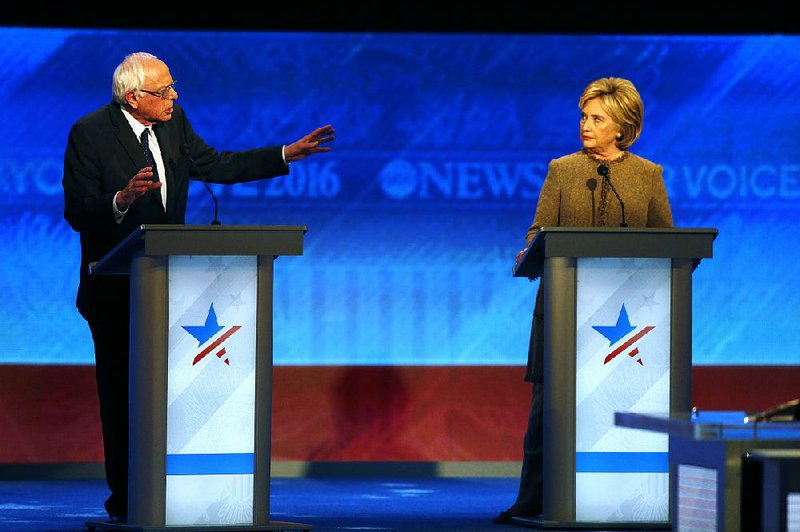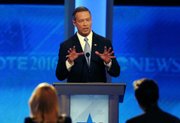MANCHESTER, N.H. -- At a debate that focused heavily on gun control and security concerns, Bernie Sanders apologized to Hillary Clinton and his own supporters Saturday for a data breach that allowed his campaign to access her team's information about voters.
Sanders explained what he knew about the data breach and offered an apology to Clinton and to his supporters for letting them down.
"This is not the type of campaign that we run," Sanders said in the opening moments of the third Democratic debate. Still, he slammed the Democratic National Committee for briefly cutting off his campaign's access to its voter files, calling it an "egregious act." He also promised to fire anyone involved in stealing such information.
Clinton quickly accepted the apology from Sanders, the independent senator from Vermont who is her closest rival in the Democratic race.
"We should move on because I don't think the American people are interested in this," said Clinton, the former secretary of state.
Indeed, the debate moved quickly to national security and gun control, as the candidates tackled questions about terrorism in the wake of this month's attack in San Bernardino, Calif. The shootings, as well as earlier attacks in Paris, have pushed national security to the forefront of the 2016 White House race.
"Arming more people to do what ... I think is not the appropriate response to terrorism," Clinton said.
Candidate Martin O'Malley, a former Maryland governor, went hard after Clinton and Sanders, accusing them of not being consistent advocates for gun control.
"Excuse me," Sanders responded. "Do not tell me that I have not shown courage in standing up to the gun people."
Clinton went after Sanders for his past record on guns, which has concerned some gun-control advocates. She said she was pleased to see he has "moved" in the face of the facts.
Clinton also defied moderators' efforts to cut her off at times, leading Sanders to call out, "Now this is getting to be fun."
The exchange stood in sharp contrast to the Republican debates, in which there has been virtually no talk about tightening gun laws.
O'Malley repeatedly injected himself into the discussion, scolding Clinton and Sanders over their records on gun control and painting himself as the true progressive on the stage.
"Secretary Clinton changes her position on this every election year it seems," O'Malley said. "What we need on this issue is not more polls, we need more principle."
National security
On national security, the candidates all issued their prescriptions for fighting the Islamic State group. None of them offered policy solutions that are significantly different from that of President Barack Obama's administration. Clinton reiterated her three-pronged plan to launch an aggressive U.S.-led campaign backing Arab and Kurdish ground forces. She also stressed a need for more intelligence sharing.
While there was agreement among the Democratic contenders that the U.S. should not launch a ground war to defeat the Islamic State, they differed in the tactics they would take and whether the nation should seek regime change in Syria, where the Islamic State has a stronghold.
Clinton recommended more direct action than her competitors, calling for a no-fly zone over part of Syria and insisting that the U.S. must seek to remove Syrian President Bashar Assad from power.
"I worry that Secretary Clinton is too much into regime change," Sanders said.
O'Malley argued that Clinton's focus on Assad was an example of a Cold War mentality.
"We have a role to play in this world, but it is not the role of traveling the world looking for new monsters to destroy," O'Malley said.
Said Clinton: "If the United States does not lead, there is not another leader -- there is a vacuum."
Sanders disagreed, saying the U.S. should first seek to defeat the Islamic State, calling Assad a "secondary issue" that should be dealt with over the course of years.
"Yeah, regime change is easy, getting rid of dictators is easy, but you have to think about what happens the day after," he said.
All three candidates stressed working more closely with Muslim-American communities to tackle radicalism at home.
Sanders sought to stand out on foreign policy by noting his anti-Iraq war stance in 2003. He said he does not support any "unilateral military action" but rather a coalition in which the U.S. works hand in hand with Muslim nations to fight the radical militant group.
The San Bernardino shootings, as well as attacks last month in Paris, pushed national security to the forefront of the 2016 White House race.
Sanders has deeply loyal supporters who are drawn to his economic- and inequality-focused campaign, but he's less comfortable discussing foreign policy issues. He sought to refocus on his core message of leveling the economic playing field for middle-class Americans, including his call for free college tuition and a single-payer health care system.
Clinton challenged Sanders on how he would pay for those proposals, suggesting he'd pass the costs to states and middle-class Americans.
She pledged that as president, she wouldn't raise taxes on families making $250,000 or less per year. "That is a pledge that I'm making," she said.
Sanders has accused Clinton of being too cozy with Wall Street and running a campaign funded by wealthy executives, claims she has rejected. Asked whether corporate America would love a Sanders presidency, he said simply, "No, I think they won't."
When Clinton was asked whether Wall Street would support her as president, she quipped, "Everybody should."
One thing that the three candidates did agree on was their opposition to Donald Trump, the Republican presidential candidate who is leading in most polls. They all argued that his talk of banning immigration of foreign Muslims would only lead to more violence.
"Mr. Trump has a great capacity to use bluster and bigotry to inflame people and make them think there are very easy answers to complex questions," Clinton said. "He is becoming ISIS' best recruiter."
Returning to her focus on Trump, Clinton said, "If you're going to put together a coalition in the [Middle East] to take on the threat of ISIS, you don't want to alienate the very countries you need to be part of the coalition."
Data breach
Although the candidates quickly moved on from talk of the data breach, the incident has sparked strong reactions from Sanders and Clinton staff members during what has been a relatively civil Democratic primary season, particularly compared with the Republican race.
The Democratic National Committee maintains a trove of voter information. The campaigns can add to that database -- information they use to target voters and anticipate what issues might motivate them.
In Clinton's case, campaign manager Robby Mook said that information included "fundamental parts of our strategy." Clinton aides said four Sanders workers reviewed information in 25 separate searches that included details on voter turnout and candidate preferences, revealing the Clinton campaign's approach in early primary-season states such as Iowa and New Hampshire.
Sanders campaign manager Jeff Weaver accused party leaders Friday of actively undermining the senator by imposing a sanction that could seriously damage his campaign.
The concerns follow complaints by Sanders and O'Malley that the Democratic National Committee has been protecting Clinton by limiting the number of presidential debates and holding three of the debates on weekends, when voters are less likely to be home watching television.
Sanders' campaign fired a worker involved in the data breach, and Weaver said the worker's actions were "unacceptable." But the campaign rejected the allegations that the Sanders team stole data, and it sued the Democratic National Committee to regain access to the voter information.
Sanders' campaign said its access was restored early Saturday morning.
Information for this article was contributed by Lisa Lerer, Julie Pace, Vivian Salama, Ken Thomas and Julie Bykowicz of The Associated Press; by Alan Rappeport of The New York Times; and by Sean Sullivan of The Washington Post.
A Section on 12/20/2015



